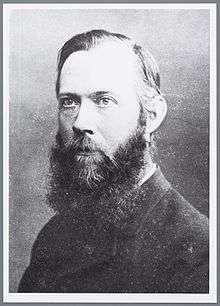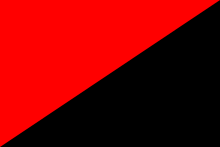Antonie Pannekoek
Antonie “Anton” Pannekoek (2 January 1873 – 28 April 1960) was a Dutch astronomer, philosopher, Marxist theorist, and socialist revolutionary. He was one of the main theorists of council communism (Dutch: radencommunisme).
Antonie Pannekoek | |
|---|---|
 Pannekoek in 1908 | |
| Born | 2 January 1873 Vaassen, Netherlands |
| Died | 28 April 1960 (aged 87) Wageningen, Netherlands |
| Nationality | Dutch |
| Alma mater | Leiden University |
| Known for | Council communism |
| Scientific career | |
| Fields | Astronomy, politics |
| Influences | Karl Marx, Friedrich Engels, Vladimir Lenin, Joseph Dietzgen |
| Influenced | Paul Mattick, Guy Debord |
Biography
Pannekoek studied mathematics and physics in Leiden from 1891. Even before he went to college he was interested in astronomy and studied the variability of Polaris. He published his first article, On the Necessity of Further Researches on the Milky Way, as a student. Some years after he had finished his study he started work at the Leiden Observatory (Leidse Sterrewacht), where he wrote his thesis.
After reading Edward Bellamy's Equality, Pannekoek became a convinced socialist and started studying Karl Marx's theories. Soon Pannekoek became a well-known Marxist writer, writing for both Dutch and German magazines. Threatened with dismissal from his job at the observatory for leading a strike support committee and dissatisfied with their outdated methodologies,[1] he decided to move to Berlin, where he became a lecturer at the school funded by the Social Democratic Party of Germany. His radical opinions soon got him in trouble with both the German government and the labor unions.
He was on holiday in the Netherlands when the First World War broke out. Prevented from returning to Germany, he started work as a chemistry and science teacher. Though the Leidse Sterrewacht wanted him back, government opposition because of his Marxist sympathies prevented his return. Instead, the Amsterdam city council got him an appointment at the University of Amsterdam in 1925, first as a part-time professor, and in 1932 as a full professor.
Astronomy
In his scientific work, Pannekoek started studying the distribution of stars through the Milky Way, as well as the structure of our galaxy. Later he became interested in the nature and evolution of stars. Because of these studies, he is considered to be the founder of astrophysics as a separate discipline in the Netherlands. He became member of the Royal Netherlands Academy of Arts and Sciences in 1925.[2]
Apart from his theoretical work, he also went on several foreign expeditions to observe solar eclipses and take spectra of stars. In 1926 he undertook an expedition to Java in order to delineate the southern Milky Way. He was also interested in the history of astronomy and his book, A History of Astronomy, is considered a standard reference on the subject.
His work in galactic structure, astrophysics and the history of astronomy was of international renown and won him an honorary degree from Harvard University in 1936, as well as the Gold Medal of the Royal Astronomical Society in 1951. The crater Pannekoek on the Moon and the asteroid 2378 Pannekoek are named after him.
The Anton Pannekoek Astronomical Institute at the University of Amsterdam, of which he had been a director, still carries his name.
Thought
Council communism
| Part of a series on |
| Left communism |
|---|
 |
|
Concepts |
|
Organizations
|
|
Related topics
|
|
A recognized Marxist theorist, Pannekoek was one of the founders of council communism and a main figure in the radical left in the Netherlands and Germany. He was active in the Communist Party of the Netherlands, the Communist Workers' Party of the Netherlands and the Communist Workers' Party of Germany.
Pannekoek was best known for his writing on workers' councils. He regarded these as a new form of organisation capable of overcoming the limitations of the old institutions of the labour movement, the trade unions and social democratic parties. Basing his theory on what he regarded as the practical lessons of the 1917 Russian Revolution, Pannekoek argued that the workers' revolution and the transition from capitalism to communism had to be achieved by the workers themselves, democratically organised in workers' councils.
He was a sharp critic of anarchism, social democracy and Vladimir Lenin and Leninism. During the early years of the Russian revolution, Pannekoek gave critical support to the Bolsheviks, a position shared by fellow council communist Herman Gorter. He expressed misgivings about the authoritarian tendencies of Leninism, fearing for the socialist character of the Russian Revolution unless it should find a rectifying support in a proletarian revolution in the West. His later analysis of the failure of the Russian revolution was that after Lenin and the Bolsheviks came to power, they crippled the soviets. Instead of workers' councils, the Bolsheviks had instituted the rule of their party, which in Pannekoek's view is what led to the institution of the Bolsheviks as a new ruling class. He put his views forward in his 1938 book Lenin als filosoof : een kritische beschouwing over de filosofische grondslagen van het Leninisme, originally published under the pseudonym J. Harper, translated in English as Lenin as philosopher - a critical examination of the philosophical basis of Leninism (1948).
Marxism and Darwinism
In a pamphlet Pannekoek strongly attacked and rebutted the arguments of Social Darwinists such as Herbert Spencer, whom Pannekoek dubbed "Bourgeois Darwinists".
On the basis of Darwin's own writings—in particular on The Descent of Man, and Selection in Relation to Sex (1871)—Pannekoek stated:
[The Bourgeois Darwinists] claimed that only the extermination of all the weak is in accordance with nature and that it is necessary to prevent the deterioration of the race, while protection of the weak is unnatural and leads to degeneration. But what do we see? In nature itself, in the animal world, we find that the weak are protected, that they don't need to persist by their individual strength, and that they are not exterminated due to their individual weakness. And this arrangement does not weaken a group in which it is the rule, but strengthens it. The animal groups in which mutual aid is best developed maintain themselves best in the struggle for existence.
— Anton Pannekoek, Darwinisme en Marxisme,[3] 1909
Works
Scientific writings
- Untersuchungen über den Lichtwechsel von β Lyrae[4] (1897)
- De wonderbouw der wereld - de grondslagen van ons sterrekundig wereldbeeld populair uiteengezet[5] (1916, 1920, 1924)
- De astrologie en hare beteekenis voor de ontwikkeling der sterrekunde (1916)
- De astrophysica en hare moderne ontwikkeling (1925)
- Results of observations of the total solar eclipse of June 29, 1927 - 1: Photometry of the flash spectrum (1928) with Marcel Minnaert
- Results of observations of the total solar eclipse of June 29, 1927 - 2: Photometry of the chromosphere and the corona (1930) with N.W. Doorn
- De groei van ons wereldbeeld - een geschiedenis van de sterrekunde (1951)
- Het ontstaan van de mens (1957)
Political and philosophical writings
- Ethik und Sozialismus - Umwälzungen im Zukunftsstaat (1906)
- Religion und Sozialismus[6] - ein Vortrag (1906)
- Godsdienst en socialisme - voordracht, op 14 September 1905 te Bremen gehouden (1907)
- Ethiek en socialisme (1907)
- Marxisme en revisionisme (1907); with Herman Gorter
- Omwentelingen in den toekomststaat (1907)
- Der Kampf der Arbeiter : sieben Aufsaetze aus der Leipziger Volkszeitung (1907)
- Het marxisme / pro: A. Pannekoek, contra: M.W.F. Treub (1908); with Marie Willem Frederik Treub
- Die taktischen Differenzen in der Arbeiterbewegung[7] (1909)
- Uit de voorgeschiedenis van den wereldoorlog (1915)
- De oorlog : zijn oorsprong en zijn bestrijding (ca. 1915)
- Darwinisme en marxisme[3] (ca. 1916)
- "The Third International," International Socialist Review," vol. 17, no. 7 (January 1917), pp. 460-462.
- Lenin als Philosoph[8] (1938) pseud.: J. Harper
- (English: Lenin as Philosopher: A Critical Examination of the Philosophical Basis of Leninism. Milwaukee: Marquette University Press, 2003.)
- Workers' Councils[9] (1947) pseud.: P. Aartsz
Footnotes
- Gerber, John P. (1989). Anton Pannekoek and the Socialism of Workers' Self Emancipation, 1873-1960. Dordrecht: Kluwer Academic Publishers. p. 210.
- "Anton Pannekoek (1873 - 1960)". Royal Netherlands Academy of Arts and Sciences. Retrieved 17 July 2015.
- "Marxism And Darwinism. Anton Pannekoek 1912". www.marxists.org.
- Pannekoek, Anton (May 20, 1902). "Untersuchungen über den lichtwechsel Algols". Leiden, L. van Nifterik Hz – via Internet Archive.
- "De Wonderbouw der Wereld". www.gutenberg.org.
- "Socialism and Religion by Anton Pannekoek". www.marxists.org.
- "Marxist Theory and Revolutionary Tactics by Anton Pannekoek 1912". www.marxists.org.
- "Anton Pannekoek: Lenin as Philosopher (1938)". www.marxists.org.
- "Workers' Councils (1947)". www.marxists.org.
Further reading
- "Anton Pannekoek (1873-1960)," in Anton Pannekoek, Lenin as Philosopher. New York: Breakout Press, 1975; pp. 120-132.
External links


- K. van Berkel, "Pannekoek, Antonie (1873-1960)", in Biografisch Woordenboek van Nederland.
- Anton Pannekoek texts at Libertarian Communist Library
- Anton Pannekoek Archive of his political writings at Marxists Internet Archive
- Exchange of letters between Cornelius Castoriadis and Anton Pannekoek, originally published in Socialisme ou Barbarie, translated and introduced by Viewpoint Magazine.
- Anton Pannekoek and the Quest For an Emancipatory Socialism
- Anton Pannekoek Astronomical Institute
- Fintan Lane, Contradicting the Bolsheviks: Anton Pannekoek and European Marxism
